The acquisition of new vocabulary is essential in terms of overall language advancement. However, there is always a need to review active words from time to time in order to use them fluently in speech. Here, we will present a couple of great vocabulary revision games which will perk up every classroom. Through these games the learners will feel how fun, entertaining and effective the learning process can be.
1. Charades
Charades is a fun and cool revision game. Students need to practice their acting skills to explain the words. This game is extremely easy to organize with minimal advance preparation. The only thing to be ready for is to keep a collection of vocabulary cards for the words you have studied.
The class is divided into two teams. Each team member takes turns acting out one of the words from the vocabulary set and explains it by acting out the word. If his or her own team can’t guess the word, the opposite team gets the chance to guess it. Each right answer equals one point.
Skyeng ищет преподавателей английского. Подробности по ссылке: Skyeng
2. Pictionary
Pictionary is also an entertaining game to play for vocabulary review. The rules are similar to those of charades except that instead of acting out the word, it is drawn on the board.
3. Bingo
Bingo can serve as a good revision game. From my experience, most of the groups/students like playing bingo because it gives them the chance to reflect on the words they have digested.
Students are given a blank bingo board and are asked to put the review words into the squares randomly. The teacher puts the active words in a hat or a box, takes them out one by one and defines them. If the student has a word corresponding to the definition, he crosses it out on his bingo board. When someone gets five squares in a row, they should shout, “Bingo!”
Check these articles out as well:
4. A memory style
A memory style card game can be another effective way for reviewing vocabulary. It requires some preparation before the game starts. For each word to be reviewed, one card should have the target vocabulary word and another card should have the definition of the word. You also need to have a big playing grid where you put the words and their definitions face down.
Each person turns over two cards each turn trying to find a match. If the cards do not match, he turns them over again and the next person tries to find a match. If he succeeds, he keeps the cards and gets an additional turn. The player with the highest number of cards at the end of the game wins.
The game can be modified even further. If you have accumulated enough synonyms or antonyms to the target vocabulary, you can practice matching target words to their antonyms or synonyms.
5. Categories
Categories is another awesome revision game which will make students energized and empowered. What they need for the game is to draw 4-6 columns on their paper and write a category at the top of each column. Categories fit the topics covered during the course. For example, if you have covered the business topics of Marketing, Work and Leisure, Ethics, Human Resources, Travel, you write these topics as categories.
You time the students and ask them to write as many words as possible under each category. As a further modification, choose a random letter and write it on the board. Give students enough time to write down a word for each category that starts with that letter.
Экономьте время на подготовку к урокам и проверку домашних заданий со Skyeng. Удаленный формат занятий, защита от внезапных отмен и график, который настроен специально под вас. Присоединяйтесь к нашей команде. Подробности по ссылке: Skyeng
6. Letter scramble
Letter scramble will make students really competitive and super fast. What you need is to take a list of words that your students have recently learned and write a scrambled version of each on the board. Students need to unscramble the words on their paper. The first one to finish deciphering all the words wins.
7. Stop the bus
Stop the bus is a cool game my students adore. I usually divide the class into 2-3 teams. One student from each team. This student sits on a chair facing his peers. Then from behind the student in the hot seat, show the other students a word from the lesson. The other students must try to describe what the word is without saying the actual word. And the student in the hot seat must guess.
The student who guesses the word shouts out “stop the bus” and checks the word with the teacher. If correct, the team gets a point. If wrong, other teams have the chance to guess the word by writing their versions on a piece of paper and passing the papers to the teacher.
8. Puzzles
Puzzles is another cool and easy tool to review the material in an effective way. What I like about this way of vocabulary revision is that students can work in pairs or groups while trying to find words matching the definition in the crosswords. They learn by listening to each other, cooperating to find the right answer. In this way, they both review the material and improve their teamwork skills.
Follow this link to get templates of different types of puzzles.
We also recommend watching a video with Alexei Konobeev. The speaker shared games to help your students remember new vocabulary. These games do not require special training and you can adapt them to any age and level.
We hope that all these games would serve their best to liven your vocabulary revision sessions and make them more meaningful and effective.
Which of these games have you tried? Which ones have you picked up for your next revision slot?
I played a card game ages ago where the goal was to be the first person to find the common thread between 3-4 words or phrases. For example a card would read: -An injury -A glass sheet -Liam from one direction
Answer: pain, pane, payne
The rounds would rotate the “judge” or person who read the card and knew the answer. First person to correctly identify the commonality wins the card.
What is this game?
level 1
It sounds very similar to Tribond.
level 2
Not that, but it’s not far off the concept! It most definitely just had 3-4 phrases/words per card. No Trivia questions
This post contains affiliate links.
Vocabulary card games are a fun and easy-to-use way of teaching target vocabulary to preschoolers and elementary students. But their practical usefulness greatly depends on how they are used, for example:
- Whether there is enough repetition (especially for unknown words)
- If the words appear in context (other related words, visual context, examples of use of the word…)
- Whether the rules make you actually use the words (nothing beats pratice to ensure that a new notion is firmly remembered)
- Whether you can target specific words that you want to teach, etc…
Needless to say, the existing games on the market do not have all these qualities, and I was really curious to know and share with you which ones fare best in this regard (in my opinion of course).
The vocabulary card games in this table are arranged according to the learner’s age range. I hope that this comparison table will help you find the best game for your family or class.
| Game | Age | Players | For | Price | Rating |
| English Vocabulary Builders | 4-6 | 2-6 | Families | $$$$ | ★★☆☆☆ |
| Can Do! Vocabulary | 6-8 | 2-4 | School | $$ | ★★★☆☆ |
| Super Sleuth | 8-12 | 2-4 | School | $$ | ★★★☆☆ |
| Triple Talk Vocabulary Cards | 7-9 | 2-4 | School | $$$ | ★★★★☆ |
| Can Do! Prefixes & Suffixes | 8-10 | 2-4 | School | $$ | ★★★★☆ |
| Just for Laughs | 8+ | 2-4 | Families, School | $$$ | ★★★★☆ |
| Classwords | 7-11 | 2-8 | School | $$ | ★★★☆☆ |
| Word Waffle | 10-11 | 2-4 | Families | $$ | ★★☆☆☆ |
| I Have. Who Has? | 10-12 | 2-4 | School | $$ | ★★★☆☆ |
| Say It! | 10+ | 3-8 | Families | $$ | ★★☆☆☆ |
| Word Teasers | 8+ | 2-10 | Families | $$ | ★★★☆☆ |
| Scattergories | 7+ | 2-4 | Families | $$ | ★★★★★ |
| Wordsmithery | 14+ | 2 | Families | $$$ | ★★★☆☆ |
| Early Learning Language Library | 3-5 | 2-6 | Families, School | $$ | ★★★★☆ |
Can Do! Vocabulary (Lakeshore Learning)
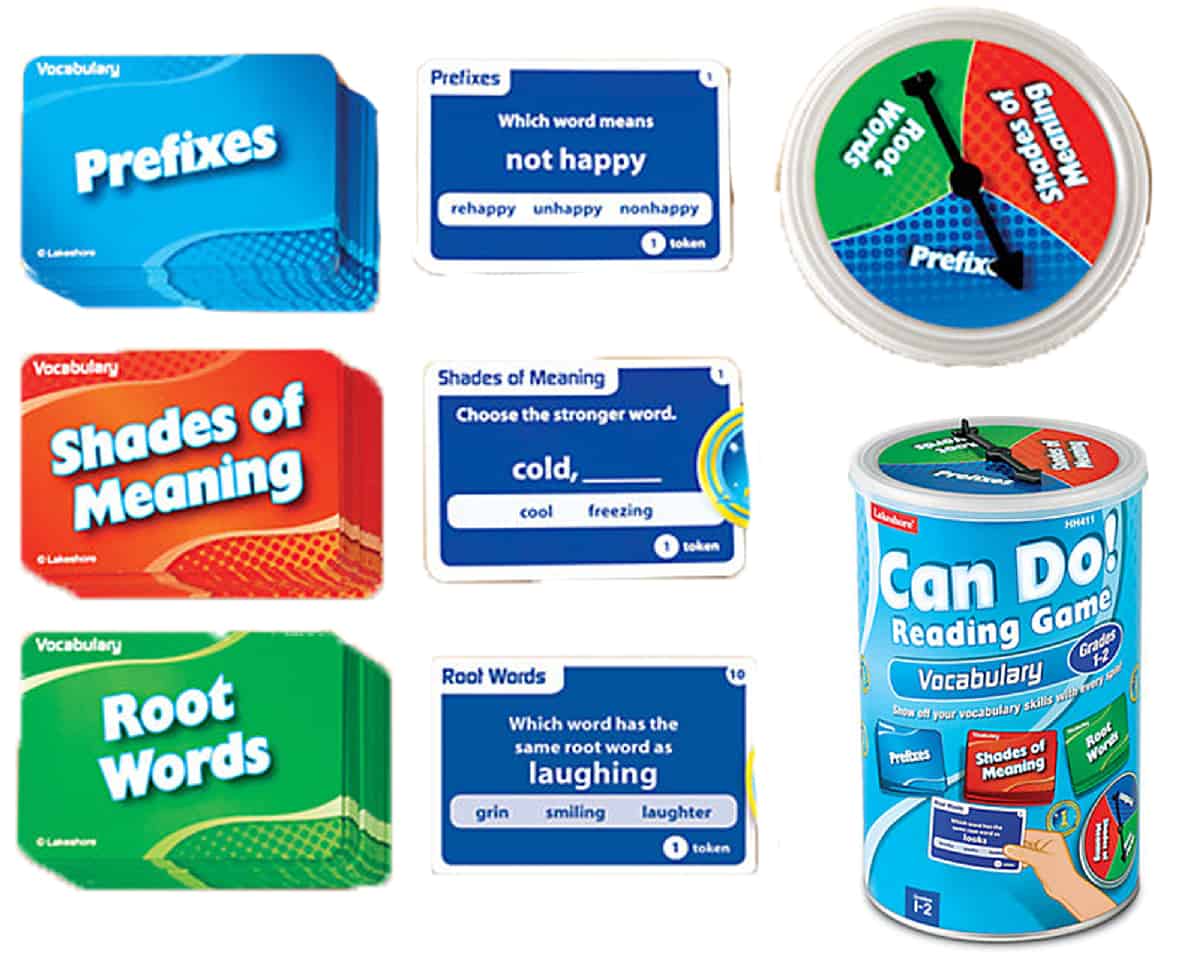
★★★☆☆
For Teachers | Age 6-8 | 2-4 Players | Grade 1-2
In Can Do! Vocabulary Game
It contains 60 question cards, 44 game tokens, and a canister. The lid of the canister is used as a spinner.
The first player to obtain 10 tokens wins the game.
I recommend this game with children aged 6-7 years old because
- The multiple choice answers are relevant (not just here for fun but relate to the type of question)
- Answer cards enable self-correction, which is great at school
- The game is rather fast paced and very simple
Classwords (Edupress)
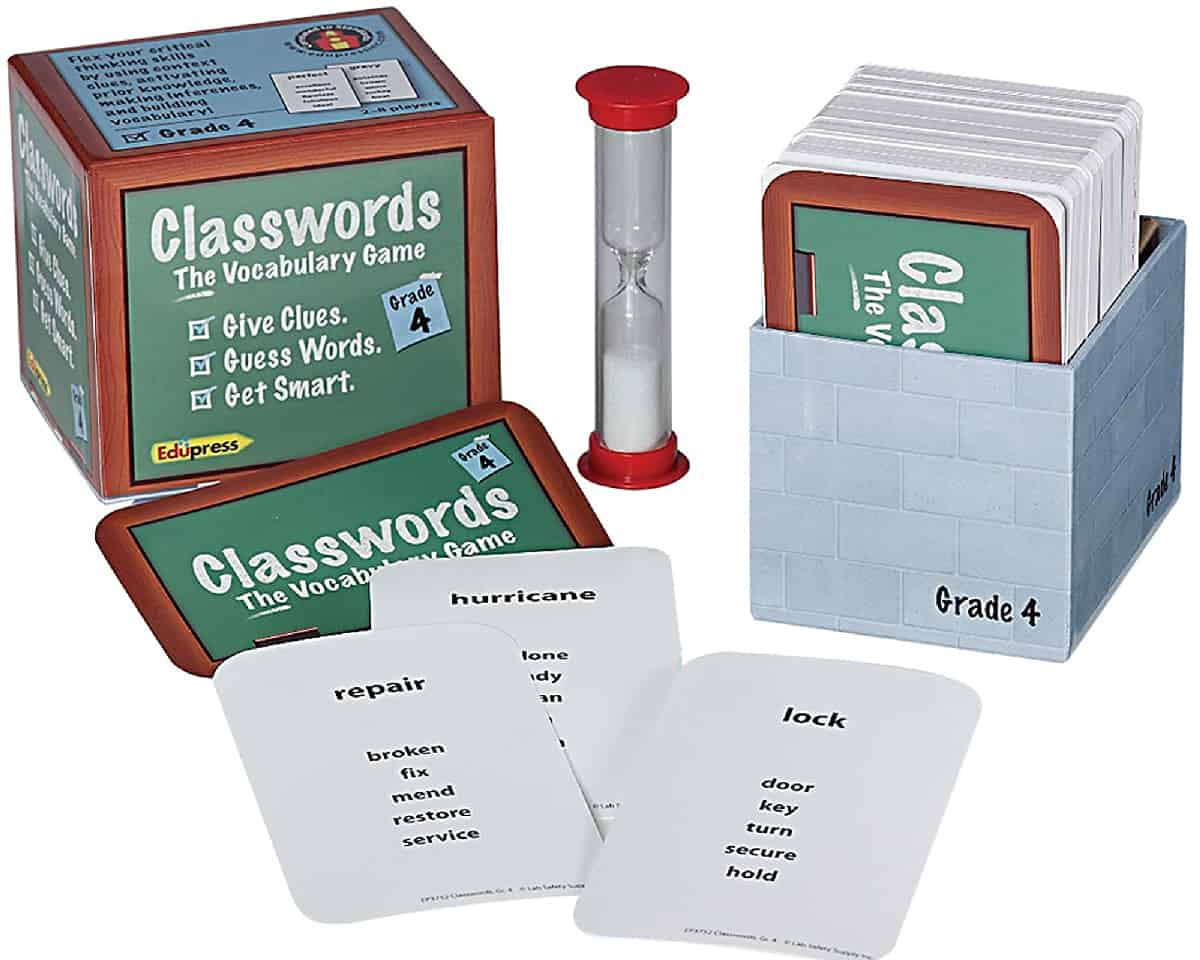
★★★☆☆
For Teachers | Age: 7-11 | 2-8 Players | Grade 2 to 6 according to the version
In Classwords,
This game can be used for practicing vocabulary in short sessions: It is easy to set up and can be played with 2-4 players on each team.
the strong points of the game are that:
- The words of a given card are in the same theme
- The guessing involved is intriguing for the children
- There are versions of the game for grade 2, 3, 4, 5 and 6 (here the Grade 4 version is shown)
Say It! Game (Gamewright)
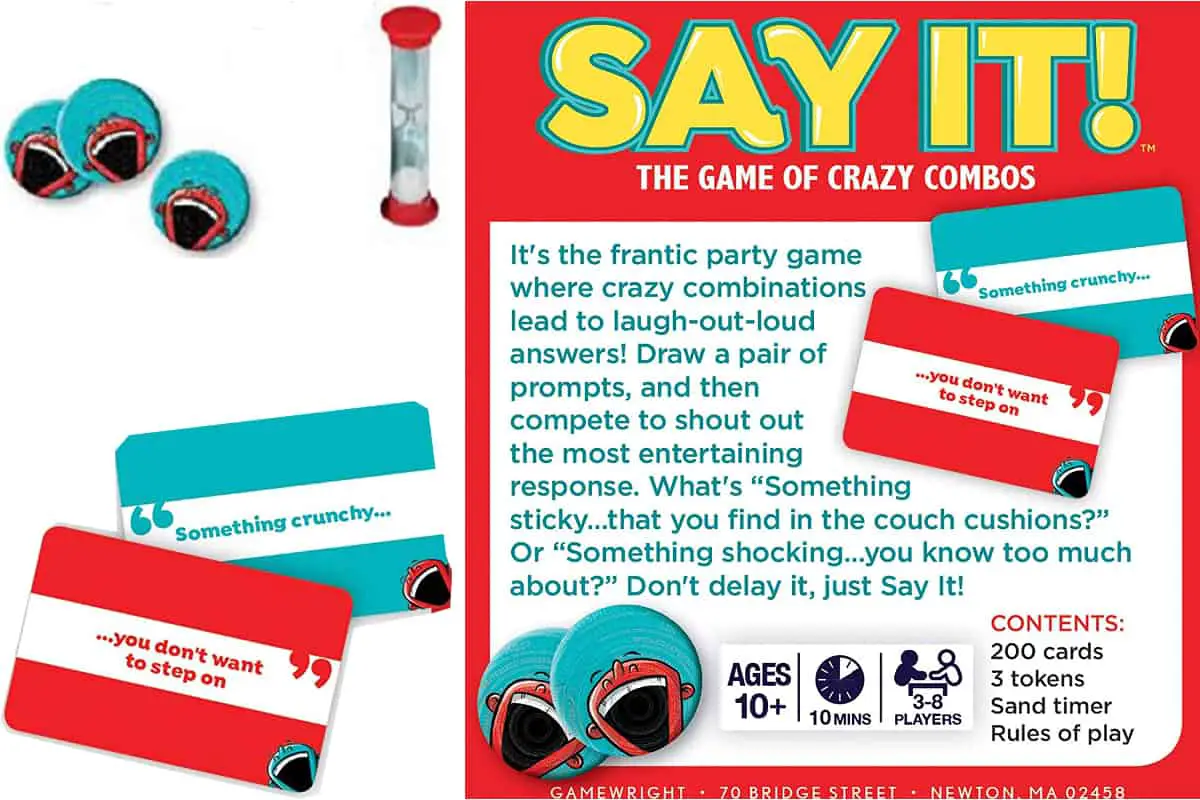
★★★☆☆
For Families | Age 7+ (with my tweak, otherwise 10+) | 3-8 Players
Say It!
In Say it, players pick a pair of cards (among 200) and compete to propose an answer that fits the pair of cards within 30 seconds (a timer is included).
For example, the categories are “something sticky “and “that you find in couch cushions”. Tokens are given to players with the most clever or funniest answer. One token is equivalent to one point and the player with the highest score at the end of the game wins.
When you play with younger children, I recommend not using the tokens. This way, you do not count the points, and the aim of the game is just to have fun together. Of course, there is a second, less obvious aim, which is to learn new words from older players.
English Vocabulary Builders Super Deck Card (Strong Learning)
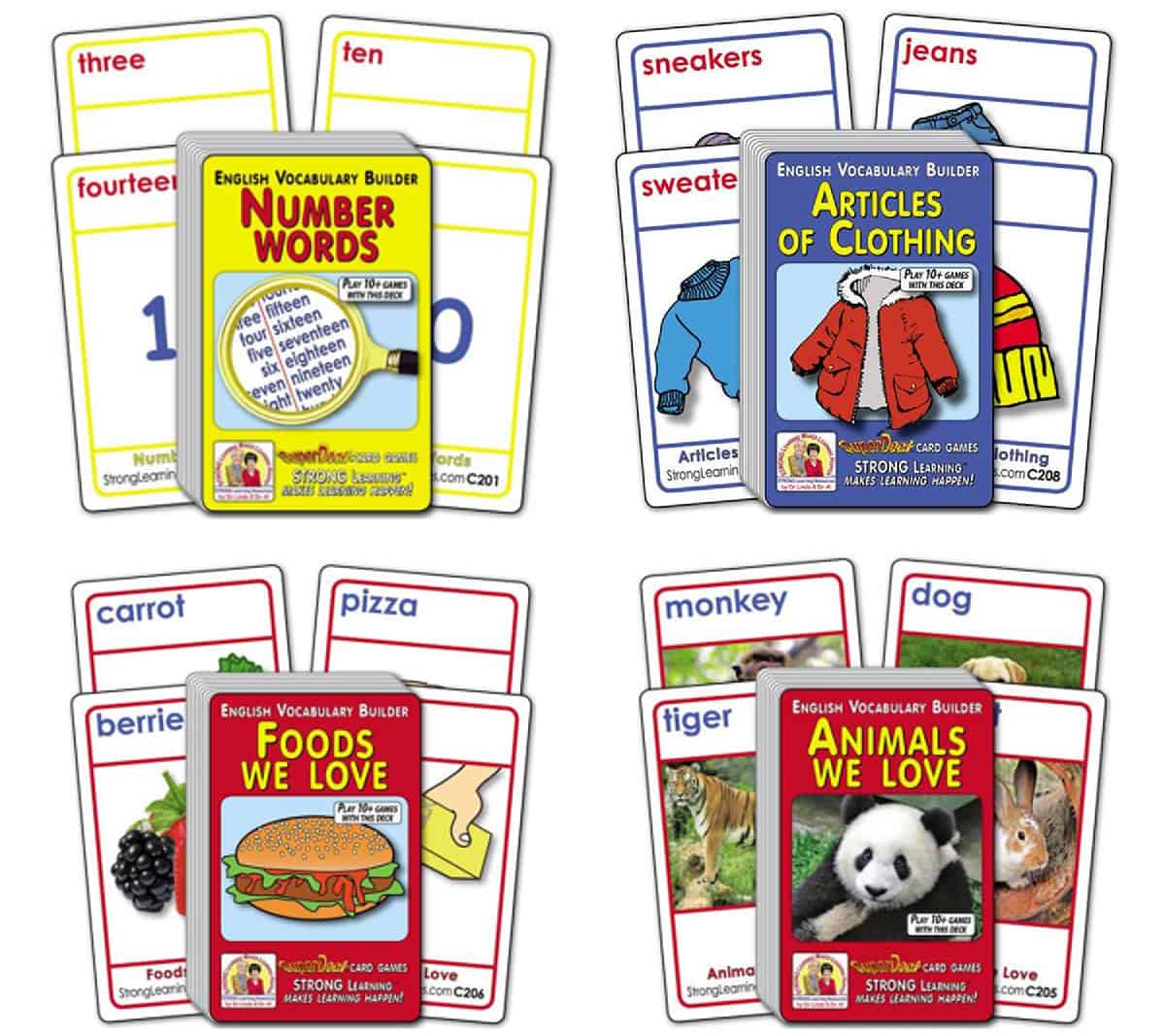
★★☆☆☆
For Families | Age 4-5 | 2-6 Students
English Vocabulary Builders Super Deck
- Animals
- Clothing
- Colors and Shapes
- Foods
- Numbers
- Body
Each deck contains a word list card and an “Old Maid” card.
The sets are relevant for children at pre-kindergarten or Kindergarten because the vocabulary is very simple and should be known by age 5. I do not recommend using them with 6-year-old children as there is no progression in the difficulty of the spelling.
Scattergories Categories (Rejects from Studios)
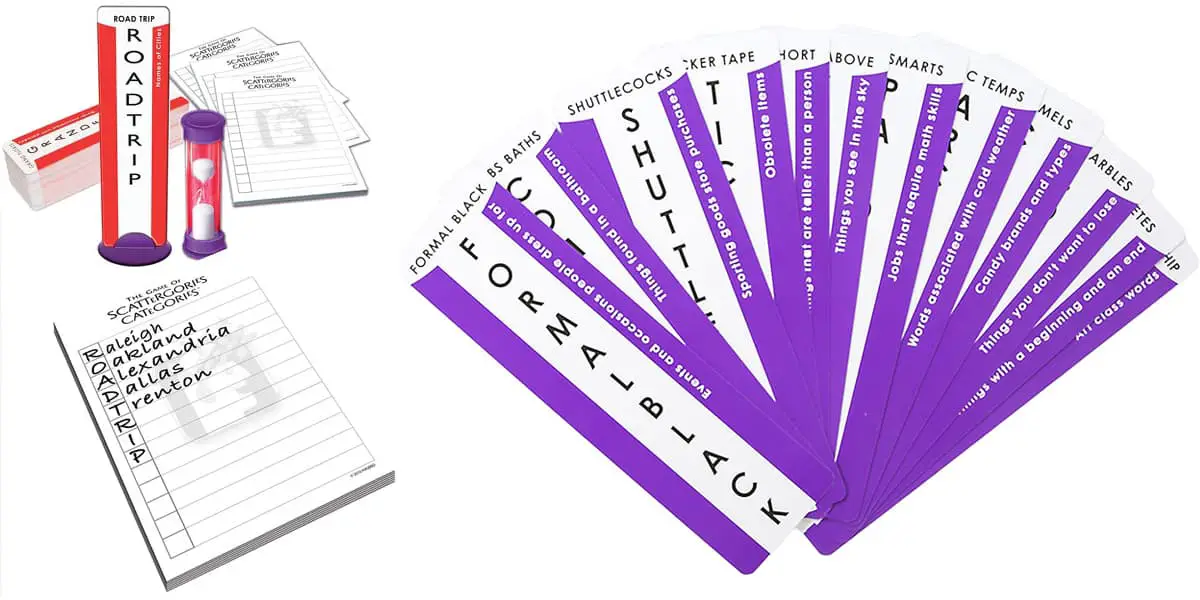
★★★★★
For Families | Age 7+ (with my tweak) | 2-4 Players
In Scattergories Categories
- Start with the letters on the word on the card drawn at the beginning of the round.
- Fit with the phrase
For instance, the word is “MARBLES” and the phrase is “Things you don’t want to lose”. Players must write on the pad things that they don’t want to lose that start with M, A, R B, L, E, and S.
Each answer that does not match another player’s answer scores one point. The first player to obtain 25 points wins the game.
The 125 cards enable to draw 250 words/phrase challenges.
I recommend Scattergories Categories because:
- Phrases can hint to specific themes that you want players to work on. To achieve this, you can keeping in the game only a subset of the 250 words, or invent new “word – phrase” pairs
- The scoring mechanism encourages to propose not too obvious words that nevertheless fit with the phase. This makes it very likely that younger players will learn new words from older ones
- Players can review the words on their pads later (great for debriefing the game)
The problem with players of different ages is that younger players have a much more limited vocabulary and will be at a disadvantage (of course they will be discouraged and will not want to replay the game).
So the standard rule is OK with players from the same age (for example the same class).
I have my “secret sauce”.
To play with children of different ages, just make the number of points required to win depend on the player’s age. I recommend (from 7 Year-old to 15 Year-old) a number of points equal to twice the age minus 5 (for example, 15 points for a 10-year-old). 15 year-olds and older should do 25 points to win.
This tweak enables children as young as 7-year-old to play the game, which was not intended originally (the publisher recommends Scattergories from 10 and up).
I Have. Who Has? (Teacher Created Sources)
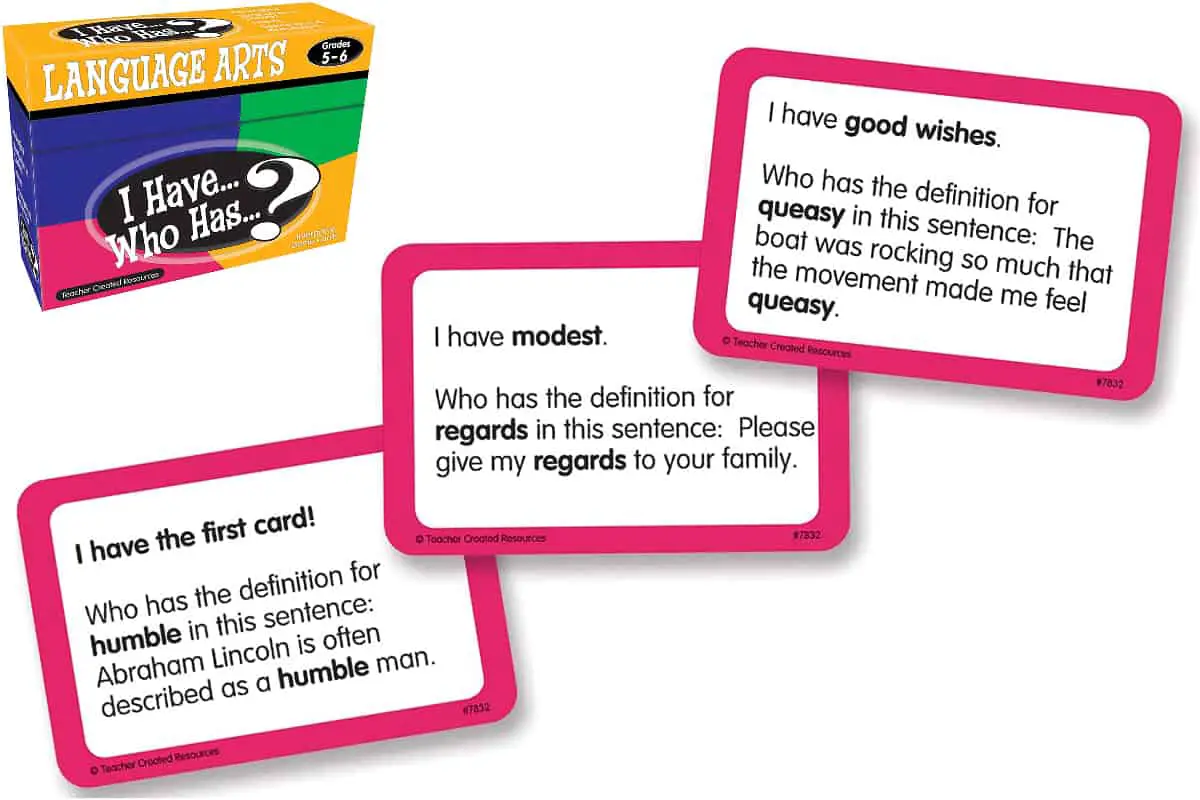
★★★☆☆
For Teachers | Age: 10-12 | 2-6 Players | Grade 5-6
In I Have. Who Has?
The 37 cards can be used as a warmup or enrichment activity in grades 5 and 6.
“I Have Who Has” is a classic in the classroom, and this one is interesting as there is a real challenge in finding the related word.
Word Teasers (Word Teasers)
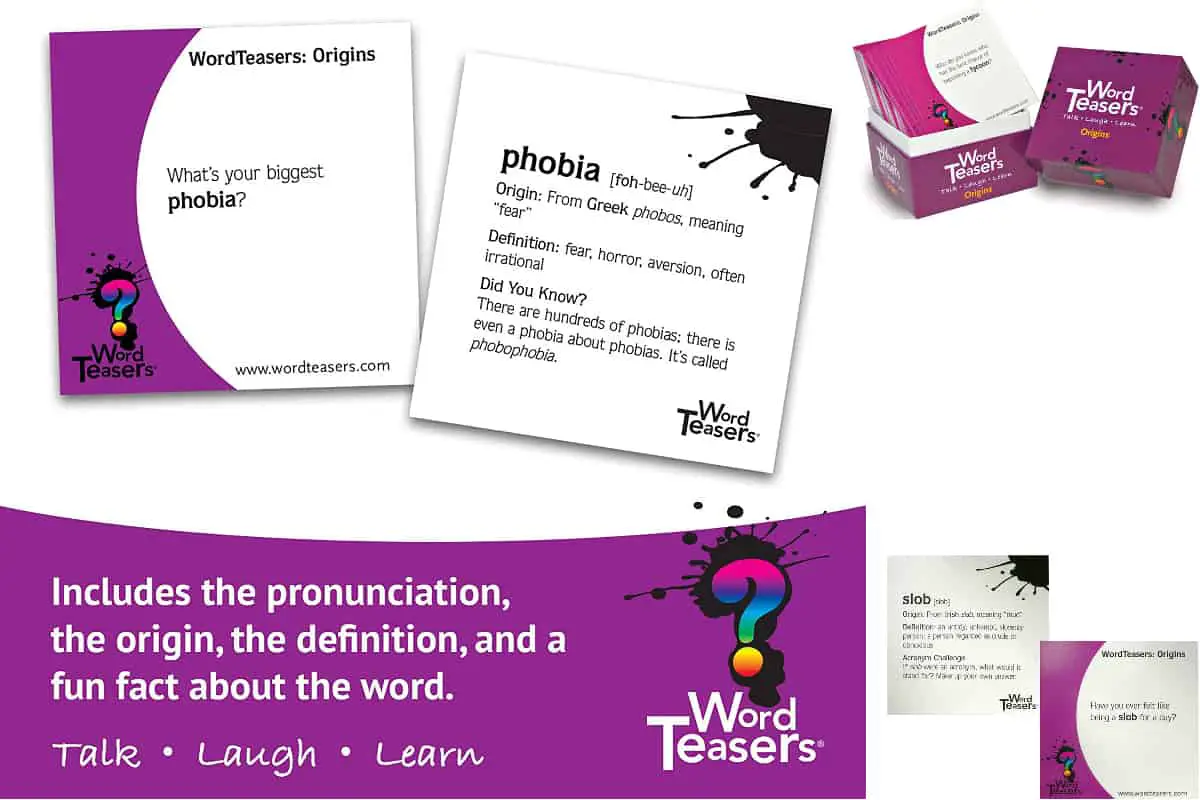
★★★☆☆
For Families | Age: 8+, according to version | 2-10 Players
Word Teasers
- As a vocabulary quiz game, using the word’s definition on the back side of the cards (when available)
- As a conversation starter, using the question on the front side of the cards
- As a synonym quiz game, using the list of synonyms (when available)
- Through the other infomation on the card backs, which depends on the version of the set:
- Small Fry (8+): “fun fact”
- Junior (9+), Middle School (11+) & SAT Vocabulary (13+): pronunciation, definition, function and synonyms
- Origins (13+): pronunciation, definition, origin (etymology) and “fun fact”
Although they are just flashcard sets, “Word Teasers” are really valuable because of the information on the cards which is well-chosen, and the versions of the game by age group.
Can Do! Prefixes & Suffixes (Lakeshore Learning)
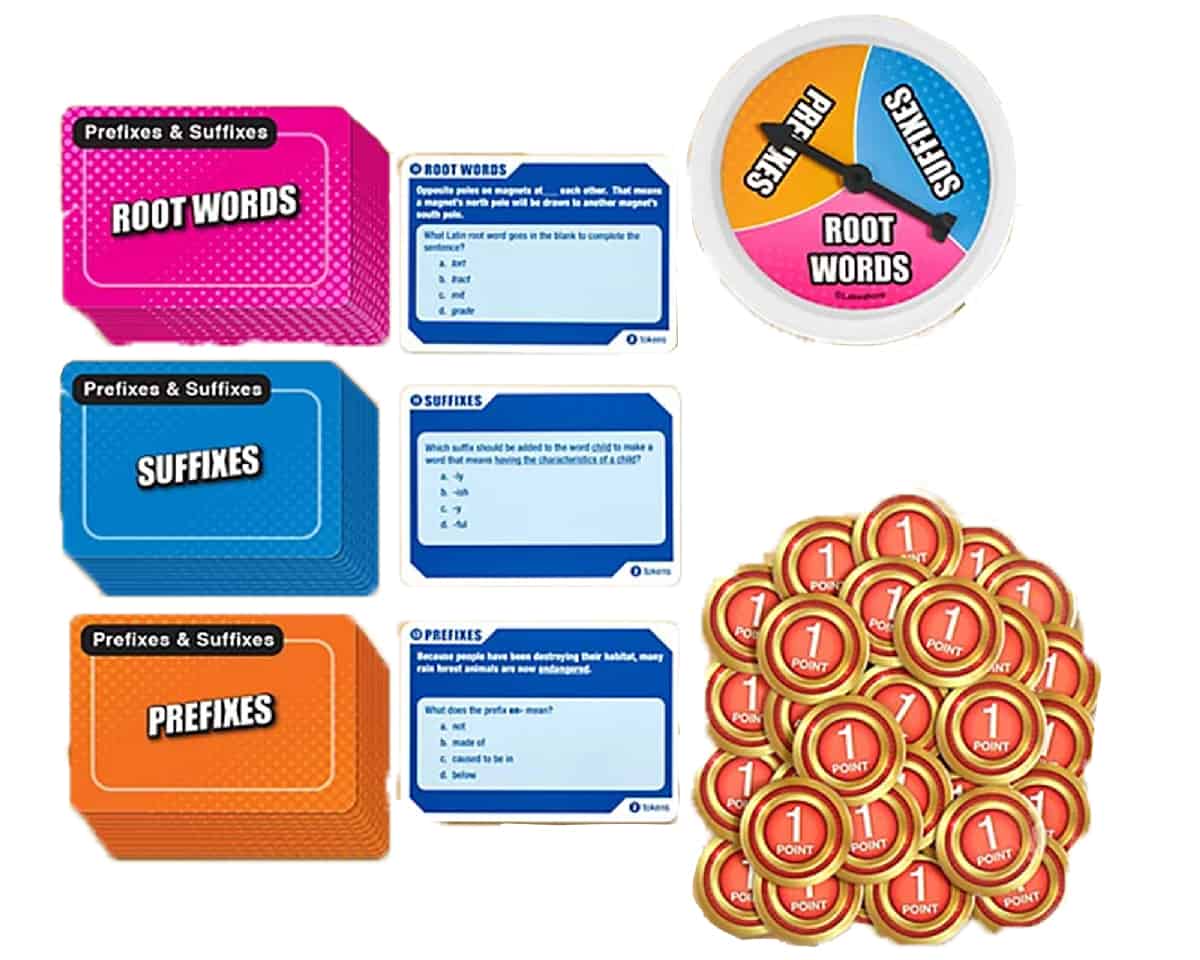
★★★★☆
For Teachers | Age 8-10 | 2-4 Players | Grade 3-4
Can Do! Prefixes & Suffixes
Players draw a card according to the category drawn by the spinner. If they answer the question correctly, they receive tokens. You might want to avoid counting points with these tokes, as it makes the game a little too competitive for the classroom.
The detailed content is a strong point (sample sentence on top of the card, relevant options to choose from, answer card). This game is relevant because it helps understand how words can be derived using word parts.
Wordsmithery (Clarendon Games)
★★★☆☆
For Families | Age 8+ (for the easy words) | 2+ Players
Wordsmithery
Players win points if they guess the correct meaning of the word out of three options. The first player or team to get ten points wins the game (takes about 20 minutes).
Highlights:
- Contains easy and difficult words (50 easy words for kids out of 600). The problem is that the words in general are not classed by difficulty (it would have enabled to adapt the game to the level of the players, manage a progression…).
- Pronunciation is included
- On the downside, the game is quite repetitive (just a quiz, nothing else)
Triple Talk Vocabulary Cards (Super Duper Inc)
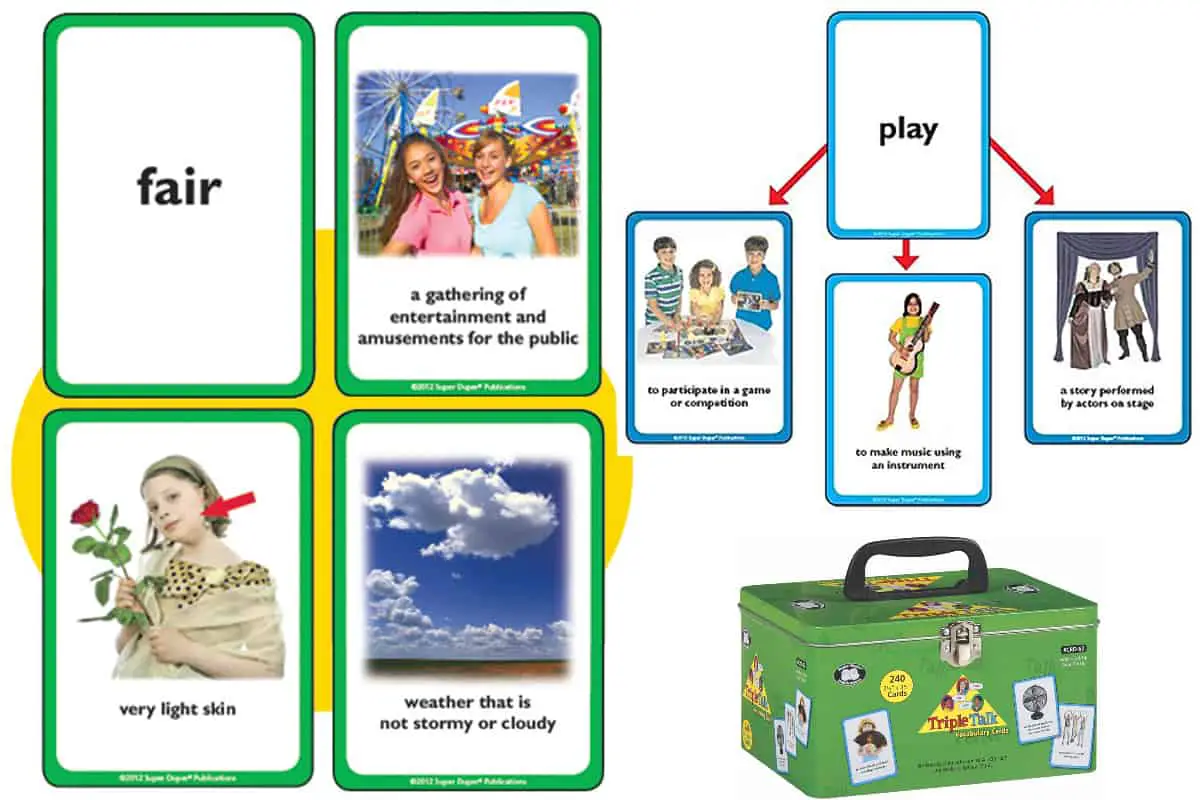
★★★★☆
For Teachers | Age 7-9 | 2-4 Players | Grades 2-3
Triple Talk Vocabulary Cards
The photo-definition cards are classified according to three levels of difficulty:
- Level 1: definitions that are most familiar to students
- Level 2: definitions that are not common or less known by students
- Level 3: definitions that are generally unknown to students (the words are defined as parts of speech such as nouns, verbs and adjectives)
I give four stars because
- The content is well-thought, with 3 levels of progression in difficulty noted on the cards
- The gameplay is easy to understand and exciting (the pictures help visualize the meaning)
Just for Laughs (Super Duper Inc)
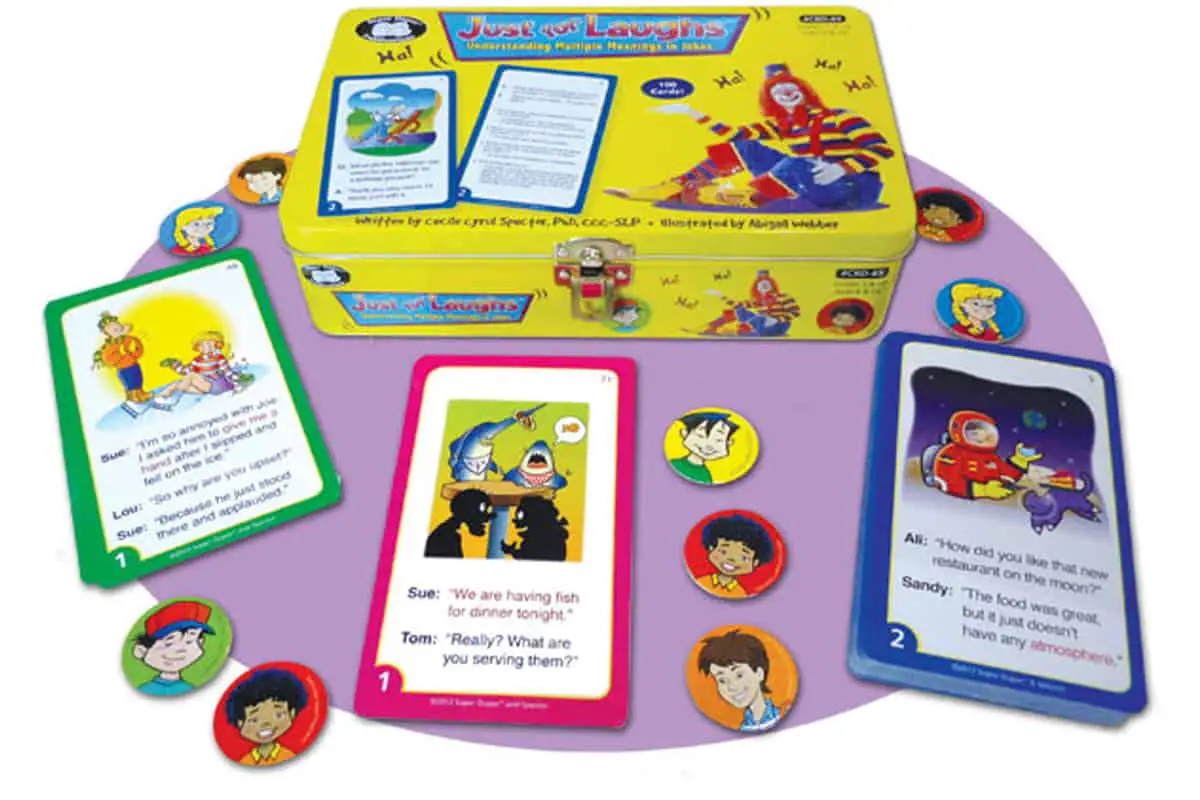
★★★★☆
For Families and Teachers | Age 8-10 | 2-4 Players | Grades 3-4
In Just for Laughs
- 40 cards with multiple meaning words
- 30 cards with multiple meaning phrases
- 30 cards with multiple meaning sentences
The front side of the card contains a funny drawing and a joke. the other side has questions and answers about the joke, related to the multiple meanings of the word, phrase, or sentence.
I highly recommend “Just For Laughs” because
- Illustrations help players understand the joke
- Explanations are properly sequenced and labeled
- Children love jokes. Explainig in details how multiple meaning jokes work might seem dull (it is often sayed that a joke requiring an explanation is not funny any more), but in fact it can be fascinating for children to discover how they can crack jokes
Super Sleuth (Educational Insights)
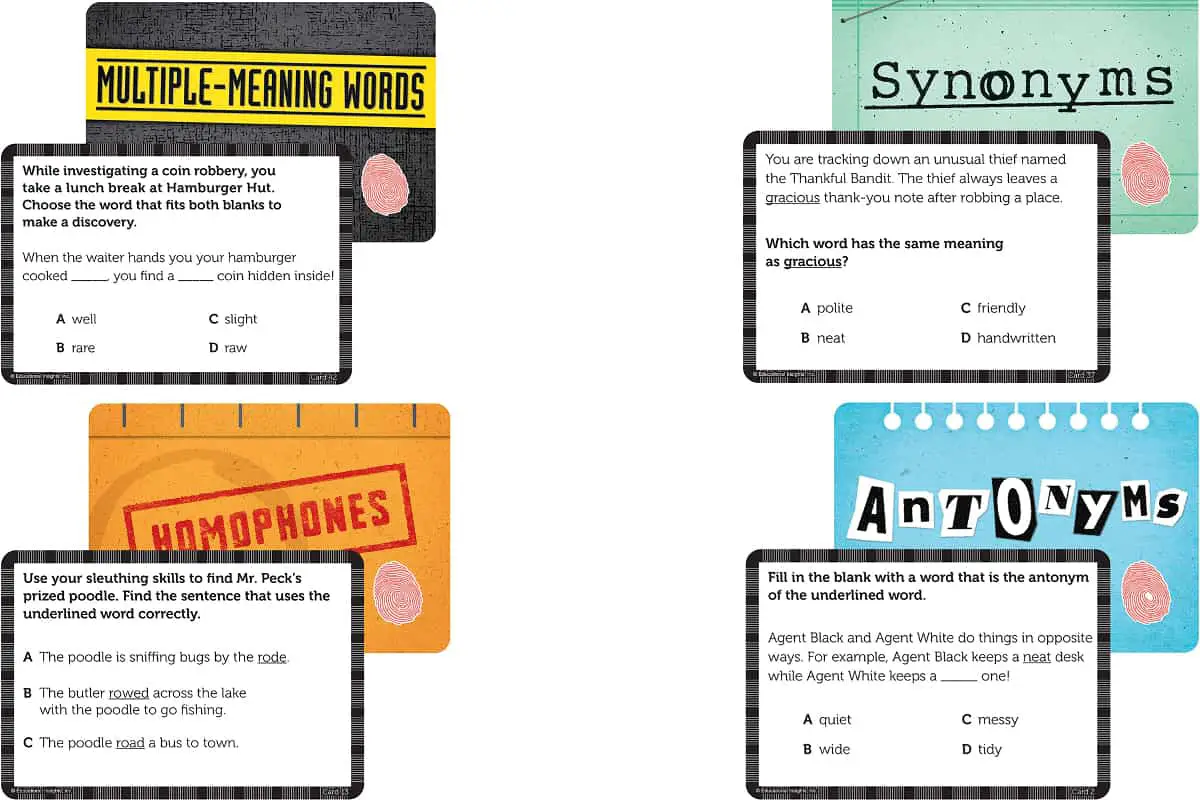
★★★☆☆
For Teachers | Age 8-10 | 2-4 Players | Grade 3-4
Super Sleuth
- Synonyms
- Antonyms
- Homophones
- Multiple meaning words
The object of the game is to collect three badges in each vocabulary category.
There are 48 badges to collect from 184 cards and 16 special assignment cards. Players check their answers using a special decoder.
The first detective to collect 12 badges wins the game and earns the title “Super Sleuth”.
Here are some pros and cons:
- It is self-correcting and exciting. Children enjoy using the special decoder or the spy glass.
- It really adds fun to the “classic” MCQ format
- However, there are no real mysteries (inherent problem with MCQs)
- Some vocabulary words are too easy (Kindergarten or Grade 1 level).
Word Waffle (Edupress)
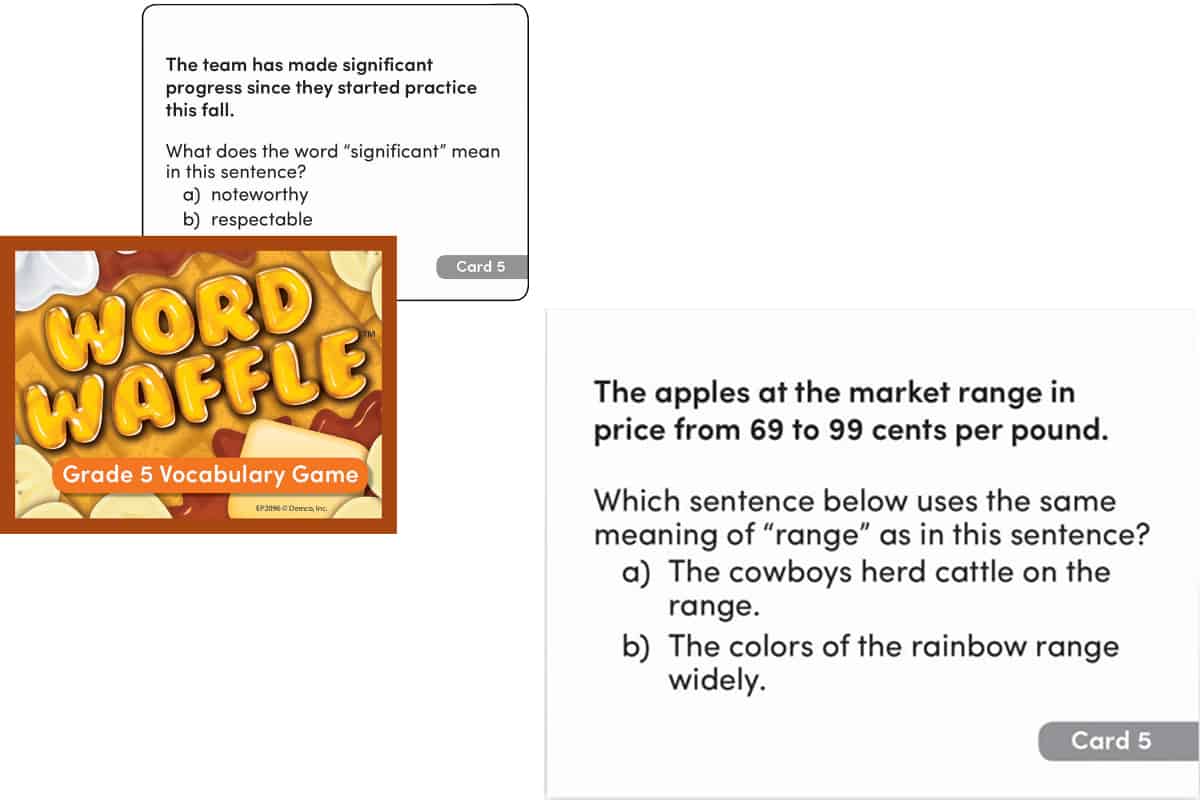
★★☆☆☆
For Families| Age 10-11 | 2-4 Players | Grade 5
In Word Waffle,
This game has 150 cards, 64 tokens, and an instruction guide.
The object of the game is to have the greatest number of tokens kept at the end of the game. Players lose all their tokens when they answer incorrectly, but they have a chance to get them all back if they draw a full plate card. The playing time takes about 20 minutes.
I don’t recommend Word Waffle because compared to “super sleuth”, there is no effort to make MCQs more enticing. the game has answer keys though, which enables children to play it autonomously.
Early Learning Language Library (Key Education Publishing)
Vocabulary flashcards are also a convenient way to organize vocabulary learning (especially by managing the repetitions). They are often categorized according to purpose or themes.
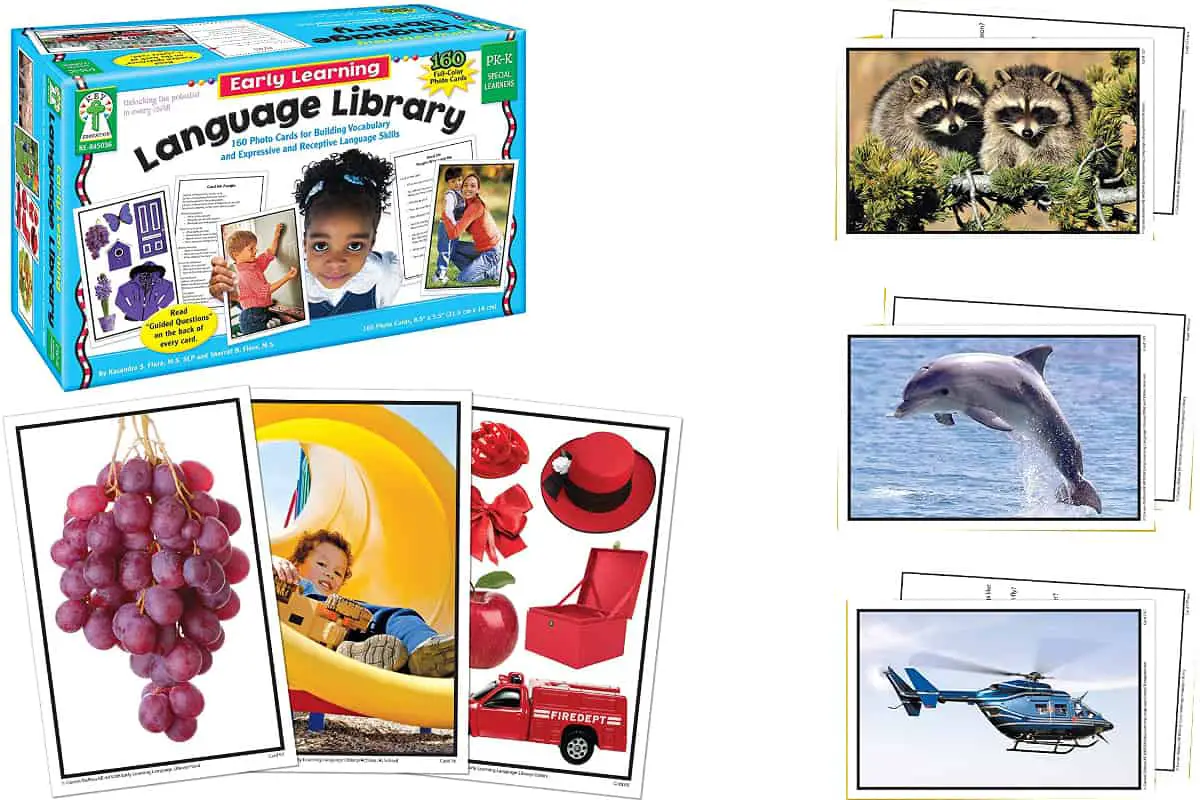
★★★★☆
For Teachers and Families | Age 3-5 | 2-4 Students
Early Learning Language Library
- Actions: At School
- Actions: Taking Care of Myself
- Actions: What are they Doing?
- Colors
- Emotions
- Farm Animals
- Food
- Wild and Water Animals
- Forest Animals
- Pets
- Transportation
A resource guide contains word lists and game ideas.
The photos are quality real-life pictures (however, some are obsolete).
The backside of the card contains prompt questions that can help children with speech delays express their ideas
Other Types of Vocabulary Games
If you are interested in more vocabulary games, you might want to check the post “12 Vocabulary Board Games for Schools and Families“.
How Does Vocabulary Develop?
Vocabulary is of course built progressively every year, but to schematize it can be divided into the following three layers:
- Basic vocabulary comprises about 8000 word families and includes early reading words, sight words, and parts of speech (nouns, verbs, adjectives). These words occur in daily conversations. Most are generally known at age 8 or Grade 3.
- High-frequency vocabulary consists of 7000 word families. These words often carry multiple meanings, and comprise many abstract words. They are used in a variety of domains which are crucial in reading and speaking. They are generally expected to be mastered by 13-year-olds, or at the end of middle school.
- Low-frequency vocabulary includes jargon or specialized vocabulary in specific domains like technology, occupation, school and more. They are rarely used unless needed in the situation. Knowing them or not depends on your interests, competences and experiences. Adults generally know around 30000 words, half of them being low frequency vocabulary.
Edudingo.com is a participant in the Amazon Services LLC Associates Program, an affiliate advertising program designed to provide a means for sites to earn advertising fees by advertising and linking to Amazon.com. We also participate in other affiliate programs which compensate us for referring traffic.
| Players | 4 or more |
|---|---|
| Age range | 12 and up |
| Setup time | < 1 minute |
| Playing time | 10 min to 15 min |
| Random chance | Medium |
| Skills required | Team play |
Catch Phrase is a word guessing party game commercially available from Hasbro.
Game components[]
Initially, the game consisted of a timer and a plastic disc that displayed one word at a time. Later, stand-alone electronic devices with built-in random lists of word phrases were made available.
Game play[]
The game is played in two teams. The goal for each player is to get their team to say the word or word phrase displayed in the disc. One member of a team starts the timer and tries to get his or her team to guess the displayed word or phrase. A clue-giver can make any physical gesture and give almost any verbal clue, but may not say a word that rhymes with any of the words, give the first letter of a word, say the number of syllables, or say part of any word in the clue (e.g., «worry» for «worry wart»). When the team guesses correctly, the other team takes its turn. Play continues until the timer runs out. The team not holding the disc when time runs out scores a point. They also have one chance to guess the word or phrase, with team members allowed to confer; a correct answer earns a bonus point. The first team to score 7 points wins.
Original version[]
The older version of the game contains discs with 72 words on each side. The word list is advanced by pressing a button on the right side of the disc apparatus. A timer beeps at an increasing rate before randomly buzzing, signaling the end of turn. A scoring sheet is provided.
Electronic versions[]
A later version, also known as Electronic Catch Phrase, is an electronic game (a device similar in appearance to the original version) with integrated phrase list, timer, and scoring. The game unit has a LCD screen to display the words and buttons to start the timer, advance play, and assign points to teams. Teams must guess the entire phrase as displayed.
A second edition of the electronic game with a changed appearance has a backlit LCD screen and a visual score display rather than the auditory score system.
Word list[]
The electronic’s version’s word list contains 10,000 words, which are categorized:
- «Everything» – all 10,000 words in the game
- «Tech/Inventions» – Anything that has been invented through the ages, from ancient history to modern times
- «History Buff» – History, politics, wars, civics, and things in the present that will become history
- «Entertainment» – Movies, music, books, actors, singers, authors, as well as fun activities
- «Sports/Games» – Sports and games of all sorts, leisure activities
- «Geography» – Places, both geographically and answers to the question «where?»; Also things that are usually found in a particular place or region
- «Transportation» – Methods of transport, as well as things seen while travelling
- «Around the House» – Household items
- «Food/Drink» – Foods and drinks, cooking terms, ingredients, restaurants, other food items
- «Plants/Animals» – Plants, animals, items made from plants or animals
- «Family» – A subset of the words appropriate for children, no adult themes or terms
Variations[]
Advanced players and teams tend to forgo the game board. Instead, one person is assigned as the score keeper and tallies the points along the way.
Elimination Variation[]
A fast-paced and fun variation for large groups is to have multiple teams and play elimination style. Players split up into teams of two and are arranged in a circle, with teammates facing each other.
- The team starting the round will pick a category and announce it to the group. Play starts as soon as the timer is started. The player must then get their teammate to correctly say the phrase by following the rules of normal play regarding clue-giving.
- If a team guesses the phrase correctly, the device is passed to the player to the left as quickly as possible, without restarting the timer, and no point is scored.
- If a team has the device when the buzzer sounds, the round is over and their team scores a point.
- An answer that has started before but ends after the buzzer sounds (buzzer beaters) will count as long as it is correct.
- If the buzzer sounds during a pass, neither team scores a point. A pass occurs from the time one team gets the phrase correct until the second team begins giving a clue.
- When a team scores a certain amount of points they are eliminated from play, and play continues until only one team is left. The amount of points required to eliminate a team from play can vary depending on the size of the group. For instance, larger groups may find that the game moves faster if they play single eliminaton.
Since teams are often passed the device with little time left they are forced to try to guess the phrase as quickly as possible as each point they earn moves them closer to elimination. This adds a frenetic pace to the game (especially when the timer starts ticking fast and you know you only have seconds left) and things can get exciting very quickly. To make things a little easier, each team may be allowed to skip one phrase per turn if they think it is too hard to describe in the time available. Each time the timer runs out, the team left holding the device can change the category if they so desire and must announce the new category to the group before starting the next round. The category cannot be changed once the timer has started.
It is considered good sportsmanship for the passing team to skip to the next phrase before passing the device as quickly as possible to the next team, and to start giving clues as soon as possible after receiving the device. If a player waits an unreasonable amount of time (decided by the group as a whole each time an infraction occurs) before passing the device, or before beginning to give clues after receiving the device, that player’s team will receive a point and the round ends.
The game is similar to Taboo, also from Hasbro, in which a player tries to get his or her teammates to guess words without using the word in question or five related words.
Hasbro |
|
|---|---|
| Games | Aggravation · Are You Smarter Than a 5th Grader? · Axis & Allies · Barrel of Monkeys · Battleship · Boggle · Bop It · Buckaroo · Candy Land · Catch Phrase · Chutes & Ladders · CirKis · Clue · Connect 4 · Cootie · Cranium · Crazy Old Fish War · Crocodile Dentist · Cuponk · Dart Tag · Designer’s World · Duel Masters · Dungeons & Dragons · Elefun · Funglish · Gator Golf · Girl Talk · Guess Who? · Guesstures · Hi Ho! Cherry-O · Hungry Hungry Hippos · Jenga · Lazer Tag · Magic: The Gathering · Mall Madness · Memory · Milton · Monopoly · Mouse Trap · Mystery Date · Operation · Ouija · Parcheesi · Partini · Perfection · Pictionary · Pictureka! · Pretty Pretty Princess · Risk · Rook · Scattergories · Scrabble (US) · Simon · Sorry! · Stratego · Taboo · The Game of Life · The Game of Things · Transformers Universe · Trivial Pursuit · Trouble · Twister · Upwords · Yahtzee |
| Subsidiaries | Hasbro Studios · The Hub (50%) · Wizards of the Coast |
| Divisions/ Brands |
Avalon Hill (managed by Wizards of the Coast) · Milton Bradley · Nerf · Parker Brothers · Playskool · Tiger Electronics · Tonka |
Although the TEFL teacher with a pair of scissors cutting a worksheet into little cards has become a bit of a stereotype, it is amazing how much more stimulating an activity can sometimes become just by giving it to students as a pack of cards rather than as a single handout. Having said that, many of the games below can be played by ticking things off a worksheet rather than playing around with cards. Many of the games below are well known (hence the name of this article) and some are based on even more well-known non-TEFL card games like blackjack and snap. However, I’ve also added my own variations and tips, and the article starts with some less well-known “new classic” TEFL card games:
1. Key phrases speaking card game
Prepare a pack of cards with one phrase useful for discussions (e.g. “Do you mean…?” or “I can see why you might think that, but…”) on each card. Give one pack to each group of two to four students and ask them to deal them out. As they speak about a topic that they have been given, students must try to use as many of the phrases on their cards as possible in the conversation. As they do so, they can discard those cards face up into the middle of the table. If the other students think that person hasn’t used the phrase correctly, they can challenge that person and make them take that card back. The first person to discard all their cards, or the person with fewest cards left when the teacher stops the game, is the winner. Functions which can be practised this way include turn taking (interrupting, giving other people the turn, etc), opinions (asking for opinions, politely disagreeing, etc), and supporting arguments (giving examples, sharing personal experiences, etc).
2. Key functions speaking card game
The game above can also be played with a pack of cards that just has the names of the functions (“keeping the turn”, “strongly agreeing”, etc) on the cards. As well as saying something with exactly that function when they discard a card, students must make sure that they don’t repeat any phrases already used during the speaking activity, with their partners giving them the cards back if they say “I strongly agree” the same as someone said before or “Stop!” for “politely interrupting”.
3. Key words speaking card game
The prompt for the games above can also be single words that students must use in something they say in order to be able to discard the card. For example, students could say “How do you feel about this?” to be able to discard the “feel” card. If there are repeated cards in the pack (e.g. three «feel» cards), students must make sure they don’t use phrases that are exactly the same as others have used. As well as functional language, this variation can also be used to prompt use of vocabulary (e.g. phrasal verbs such as “get on with” and “put off”) or grammar points (with grammar words like “will” and “since”).
Variations on all three of the games above include having all the cards face up in the middle of the table for students to take as they do that thing successfully (with the student with most cards being the winner) or an extra person monitoring and giving cards to people as they do the right thing.
4. Longer phrases matching card game
Although matching up bits of paper is both more interesting and simpler than drawing lines on a worksheet between sentence halves, it is rarely worth the cutting up time involved – with this possible exception. Students match up beginnings and ends of phrases, then try to put extra words and phrases into the middle of those phrases to make them longer, e.g. “Can I phone you back” + “a little” + “later?” You can also usefully add an intermediate stage during which they brainstorm extra words that can go in the middle before they are given those middle cards. They can then use those same cards to play a version of the games above.
5. Take the cards to make a picture
You could argue that this isn’t exactly a game, but the amount of fun and useful practice that kids get out of it (especially students still learning to read) means I’ve included it anyway as a true classic. Prepare a pack of cards describing things that can be drawn such as “fish” and “plate” and aspects of those things such as “two”, “blue”, “happy” and “huge”. If they can already read quite well, you will probably also want to include grammatical words and parts of words needed to make those descriptions into sentences like “There”, “is”, “s” and “a”. Students simply take turns trying to take groups of words which describe what they want to draw and adding those things to their drawings, e.g. taking “four” + “happy” + “fish” and drawing that or accidentally taking “fifteen” + “huge” + “plates” and having to include that in their picture. If you want to have scores, you could give points for cards taken that they manage to successfully include in their picture and/ or for good final results. This works as a whole class activity with up to about eight students. With more students, you’ll need to put them in teams to take cards and draw together as a team, or classes that need little supervision could do it with one pack of cards per table.
6. Take the cards to make true sentences
This is like the activity above but is closer to an actual game. Students take words from the table in front of them to try to make true sentences, e.g. about their partners, the classroom, the teacher or the town that they are in. They get one point for each card used in the correct sentences.
7. Guess and use the letters
This is possibly the ultimate practice of phonics, as it combines practising things they already know about the letters, being able to get hints from the teacher to expand their knowledge, and a chance to be more creative with those letters. Students listen to the teacher’s descriptions of letters and shout out their names whenever they are sure what the letter is, e.g. “A!” if they hear “It’s the first letter of ‘alligator’”, “It’s the middle letter of ‘pan’” or “It comes before B”. People who guess wrongly have to remain silent until the teacher moves onto describing the next letter. The first person or team to guess correctly gets the card with the letter on it, then the teacher does the same with the next letter. After each letter is guessed, students have one minute to try to make English words out of the cards that they have, e.g. showing the teacher that they’ve put together “c” + “a” + “t”. If teams get stuck, the teacher can give hints like saying words that they can spell with their cards, telling them first letters that they can make words with, or telling them which letters they can rearrange into words.
Any attempts which aren’t real English words mean they have to wait for the next round before trying to construct more words, but real words that they make without knowing their meanings are fine. Teams which put correct English words together get an extra letter (randomly, chosen by the teacher or chosen by the team), which they can also use during that one minute to make still words if they can. The student or team with the most letters at the end of the game is the winner.
8. Revision card game
Prepare a pack of at least 30 cards with each card having several correct answers which are related to things that you’ve studied in class, e.g. “Things your partner dislikes” and “Uncountable things in this room”. As with those examples, it is best if the students need to think about both fact and language to be correct. Give one pack to each group of two to five students and tell the first student to take one card off the top of the pack. The first person must try to make correct statements as explained on the card, e.g. “Juan, I think you dislike cheese”. Whenever they make a mistake or they reach the maximum that you have set (e.g. four), they have to stop and get one card from the pack for each correct statement up to that point. Play then passes to the next person, and when play comes back to someone they can choose their next question from one of the cards that are in their hand from previous rounds. The winner is the person with most cards when the whole pack of cards has gone. Then can then work together to come up with correct sentences for all of the cards, or just the ones people took but never chose as their challenges.
A much longer variation on this game involves all the students in the group trying to get each card. One person takes a card from the pack and makes true statements until they make a mistake as above. The other people in the group then do the same for the same card, not repeating anything that people have already said. The person with the most points from that round wins the card, then play passes to the next person.
9. Extended speaking card game
This is a variation on the first version of Revision Card Game above, and is also best as a revision game. A student takes a card with a topic on it like “The near future” or “Overrated artists” and speaks about for as long as they can or up the maximum you set. The number of cards they can take (and therefore number of points they get) depends on how long they can speak for, with time taken off for silent pausing. I tend to go with one card per thirty seconds speaking, stopping at three minutes (= six cards). They can then choose from the topics in their hand when their turn comes round again.
10. Use the words on the cards for points
This is like a much simpler version of the Revision Card Game above. One student turns over the card at the top of the pack and should try to make a factually and grammatically sentence using the words on it about one of the other people in the group, e.g. “You’re dreading Monday morning” for “dread”. If they are correct, they can take the card and score a point. If not, play passes to the next person, who can choose to use the same card or turn over another.
The game can also be used to practise grammar by using words like “since” and “the… after next”. The cards could also be instructions to follow rather than words to use, e.g. “prediction” and “near future”.
11. Get the answer on the card for points
I usually use the much snappier but less descriptive name “Answer me” for this classic speaking game. In groups of two or three, students deal out the whole pack of cards. They can look at their own cards but shouldn’t show them to their partner(s). They ask each other questions and can discard their cards face up on the table if they get one of the responses written on their cards. For example, if they are holding the card “Not much” and they ask the question “How much time do you spend studying English every week?” they can discard the card if they get that response but not if their partner replies “Probably too much!” (unless they also hold a card that says that).
12. Get the answer with the card
This is similar to Answer Me above, but with students using the words on the card to make questions that receive the same kind of response each time. The most fun version is for students to always try to get the answer “I don’t remember”, for example making a question like “What was your first primary school teacher’s name?” with the card “primary school”. Other responses for students to try to get include negative answers, positive answers, big answers (e.g. “all the time” and “so many”), small answers, and “I don’t know”.
13. The T L bluff card game
This is a game which is quite similar to the non-TEFL card game called Bluff. In groups of three or four, each student is given or makes three cards with a T on each and three cards with an L on each, with the letters standing for “truth” and “lie”. Perhaps in response to a question and/ or using the language that the class is about (e.g. Present Perfect), students make a true or false statement and place the relevant card face down on the table in front of them. If anyone thinks that the statement is not true, they can challenge the person who made the statement by saying “Liar” and the card is turned over to check. If the challenge is right and the statement is a lie, the person who made the statement should take all the cards on the table at that point. If the challenge is incorrect, meaning it was a T card, the challenger must take all the cards there. If no one challenges the statement, the card just stays there face down and becomes one of the cards that will be taken later by the liar or challenger. The winner is anyone who has no cards or the person with fewest cards when the teacher stops the game.
14. Roleplay challenge card game
One student takes a roleplay card (e.g. “Go to a shop and try to find an antique which is indistinguishable from something of your mother’s that you broke”) and must find a successful solution while roleplaying that situation with their partner. If they can bring the conversation to a successful conclusion, they get to keep the card and score a point. The person with the most cards/ points at the end of the game is the winner.
To give students practice of the varieties of English communication that they are most likely to experience outside the classroom, I like to do a variation on this game where students have to choose if they will communicate by telephone, by email, by SMS, by telephone message or face to face before they start each roleplay.
15. Brainstorming challenge card game
Students turn over a card from a pack on the table and take turns brainstorming things in the category it says, e.g. “uncountable liquids” or “ways to speak about likes or dislikes”. Whenever no one can come up with any more correct answers, the last person to say something in the right category gets that card and hence a point, then the game continues with the next card in the pack. Although this does have the potential to stop them getting into the flow of brainstorming, you can also have a rule that if anyone makes a mistake, the last person to give a correct idea wins the card and one point.
16. Storytelling card game
This could be seen as a more controlled version of the key words speaking card game above. Students take turns laying down cards in a line to continue a story, hopefully bringing the tale to a conclusion when they get to (or towards) the end of the pack of cards. They can then tell the story to another group, or another group can try to guess the story from the arrangement of the cards.
The cards can be words connected to particular kinds of story (“fingerprint” and “witness” for crime, “prince” and “sword” for fairytales, “laser” and “spaceship” for science fiction, etc), words useful for telling stories (e.g. “suddenly”, “by that time”, “this caused…” etc for writing FCE stories), vocabulary in a story they will hear or read after this activity, or just a random collection of vocabulary that you want them to revise. Particularly with vocabulary for particular kinds of story, the cards could be pictures instead of words.
There are also variations on this game that are meant to stimulate more use of different narrative tenses. A simple one is telling them that they can jump back in time when they place the next card down, but they must use the Past Perfect tense to do so and must show that time shift by placing the card down in a different way, e.g. slightly above the rest of the line of cards. They can also do something similar with Past Continuous by having longer actions placed lengthways and any shorter actions placed above or below within the space covered by the longer action, for example the “Have a meeting” card is placed horizontally across the table and the “Read my text messages” card is put vertically above it for “I was having a meeting when I checked my text messages”.
The finished stories can also be used for a variation on the classic Alibi Game, with one student memorising the story as if it happened to them and being tested on what happened when. The person who makes most mistakes when questioned on their alibi is guilty of the crime.
17. Yuppies
I got this game from the classic Communication Games books, but you can easily make your own version. A pack of cards is dealt out to each group of two to four students. The first student chooses one of their cards and places it down on the table face up, saying how good that thing is, e.g. “The pot plant in my office is calming and keeps the air clean” for the card “pot plant”. The second person acknowledges the property of that thing but says one way in which the thing that they place on top is better, e.g. “That is a lovely plant, but the view from my window is more impressive than your plant” for the card “view”. The game continues in the same way until all the cards are gone or someone gives up. It’s usually best to tell them that they can’t use the same comparison twice during the game.
18. Pelmanism
This is a well-known TEFL game based on the non-TEFL card game “Pairs”, also known as “The Memory Game”. Cards are placed face down on the table and people take turns trying to find pairs such as two adjectives which take the same preposition, two irregular verbs with the same vowel sound in the past, or two nouns which collocate with “make” (rather than “do”). As with these examples, to make sure there are plenty of matches this game works best if the cards have to have something in common to form a pair, rather than (as in many textbook examples) having to go together (e.g. a “do” card with a “the laundry” card).
A less well-known but even better variation is “Random pelmanism”, in which the cards don’t have obvious similarities and so students must come up with more creative sentences to explain what they could be such as “Bushes and houses are both shorter than other similar things, namely trees and apartment buildings” if they turn over the “bush” and “house” cards.
19. Snap
This is also famous as a TEFL game and based on a well-known non-TEFL card game. Students take turns putting the top card from their pack down face up on two packs on the table, and if the two cards on the table match at any time the person who shouts “Snap!” quickest gets all the cards on the table at that point. People who shout “Snap!” when the cards on the top of the packs on the table don’t match have to “pay” two cards to each of the other people in their group as punishment. The person with most cards at the end of the game wins.
As with pelmanism above, this game works best if the cards have to be similar rather than go together to be a match and so demand shouting “Snap!”, e.g. two uncountable nouns or two time expressions which mean the future.
You might want to replace the expression “Snap!” with a more useful one for communication outside the classroom such as “They match!”
20. Dominoes
Although the non-TEFL version of dominoes is usually played with the thick blocks which are also famous for falling down one after the other in picturesque ways, it can just as easily be played with bits of paper dealt out to groups of three or four students. In its (fairly common) TEFL variations, dominoes have different words, expressions or half words/ expressions on either end in the place of the dots on normal dominoes. Dominoes can be placed down next to the ones on the table if they match what is written on either end of the line of ones that is already there, e.g. “arrive” with “at” or “come” with “from”. As well as collocations like these, you can play it with similar matches to those recommended in Pelmanism and Snap above, e.g. two positive words or two words that express uncertainty. Although many photocopiable versions are designed with only one possible way to match all the dominoes, I prefer versions with many possible matches, meaning the winner is the first person with no cards or the person with fewest cards when no one can place down any more cards.
If several matches are possible for each card as I suggest, you can also play a version of dominoes where each card has only one end (unlike the two different ends of normal dominoes). For example, the card from the pack which is turned over first says “air”, the first player lays down “port” and the next person lays down “ferry”.
Please note that your students might only be aware of the lining up vertically and knocking down use of dominoes, so it can help to demonstrate the original game first.
21. TEFL blackjack
This only works with some kinds of language and takes a fair bit of preparation, but it is possible to play a variation on the card game blackjack/ Uno to practice language including collocations such as compound nouns. As in the original card game, students play in groups of three to five, each of which is dealt five to seven cards that they can look at and must try to discard to win the game. Anyone who can’t go has to pick a card from the remaining pack, and play passes to the next person.
In the original version, players can discard cards to the top of the pile of the table if they match the top one there in terms of colour or number. In the TEFL version, students can only place down one of their cards if it makes a collocation with the word which is on top of the pile on the table, e.g. they can place down “put” or “Monday” if the word there is “on”. To make the game work, as in the original version every card in the pack must have several collocations with other words in the pack. You can also make it easier to match with “joker” cards that students can use to be any word they like, preferably letting the next person change the meaning of the joker which is on the top of the pack when their turn comes if they like. To make it more fun, you can also have cards with trick purposes similar to those in Uno and blackjack, e.g. ones that reverse the direction of play and skip the next person.
The same cards can also be used for the one card version of dominoes explained above.

